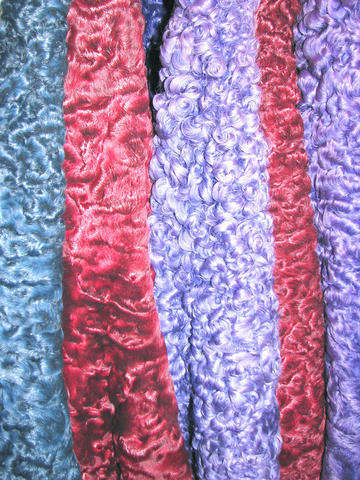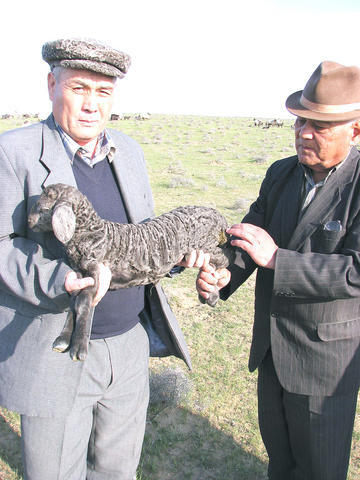A newborn karakul lamb scampers across the grass-fringed desert sand, its fur a wave of tight black curls that form a pattern as unique as human fingerprints.
Within days, the curls will unfold, become rough and wiry and turn the soft, sensuous karakul pelt -- better known as astrakhan or Persian lamb -- into cheap sheepskin.
So to save the pelt the lamb will be slaughtered and skinned before sundown -- along with dozens of others born here at the Kanimekh farm in the desert of central Uzbekistan. Eventually, the harvest of pelts will become chic coats, cuffs and collars worn by runway models and fashion victims across the globe.

PHOTO: AP
After investigators for the US Humane Society visited an Uzbek farm in 2000, they condemned the industry as "cruel, grotesque and inexcusable." But the trade has picked up sharply in recent years.
Pop singer Madonna sported a karakul coat -- until designer Stella McCartney scolded her. Celebrities like Lisa Marie Presley and Ivana Trump reportedly flaunt their karakul despite the criticism.
Activists are particularly galled by the production of karakulcha, or broadtail pelts. Every September, older ewes are artificially inseminated. The mother is slaughtered two weeks before delivery, the fetus is extracted and skinned and its body ground to feed poultry or pigs. The resulting fur resembles watered silk.

PHOTO: AP
"This method is justified, toothless ewes are destined to die of hunger anyway," said Surat Yusupov, director of the Uzbek Karakul Breeding Institute.
Shepherds say the pelts are key to their livelihood. And they point out the carcasses are not discarded: The meat is prized as a low-fat delicacy, the hooves processed for glue, the maw sold to cheese makers or pharmaceutical companies.
"We cope with life in desert and the campaigns of those activists only add to the difficulties we encounter here," said Malibek Abdukadyrov, a manager at the Kanimekh farm.
Afghan President Hamid Karzai, who has become an unlikely international fashion icon, often sports a chic karakul hat and may be partly responsible for the surge in interest in the fur. By 2004, Prada had shown a collection made of swakara, or African karakul and soon designers from Armani to Gucci presented new coats, trims, suits and skirts.
Last year, Uzbekistan sold almost 137,000 karakul pelts abroad, one third more than in 2005, reported Uzbek Karakuli, a state-run exporter. The wholesale price for each pelt climbed to US$18, while a designer coat sewn from about 30 pelts costs thousands of dollars.
The pelts may be headed to the glittering runways of Paris and Milan. But they start their journey in dilapidated facilities built in the Soviet times, when the advent of electricity and natural gas first made construction of this settlement in the Central Asian desert possible.
Karakul wool accounted for two-fifths of the Soviets' fur exports. Felt-thin and velvet-smooth, it came in a rainbow of tints ranging from black to pink to lilac, colors that were dubbed "sundown," "candlelight" or "apricot flower."
Karakul sheep first appeared hundreds of years ago in the Kyzylkum desert, around the Karakul, or Black Lake, near the ancient Uzbek city of Bukhara, said Yusupov of the breeding institute.
Bukhara's emirs maintained a world monopoly on production and export of its golden fleece -- through Persia and the Russian city of Astrakhan -- punishing would-be smugglers with decapitation.
"It was like silk for ancient China," said Kenjabai Madaminov of Uzbek Karakuli, the exporter.
Then in 1907, the last emir of Bukhara allowed the British to ship some karakul to Namibia, where the sheep became the founding herd of swakara, or Southwest African karakul. When the emir fled the Soviets in 1920, he took his best sheep to Afghanistan, now the world's leading producer of karakul.
Yusupov said, however, that Afghanistan doesn't produce the variety of karakul pelts that Uzbekistan does, because of his country's scientific breeding program. His institute, he said, has developed 28 types of karakul, five of them in recent times.
After the institute was established in 1930 in Samarkand, it opened branches and introduced sheep into other southern Soviet regions. Lambskin hats became a distinction of Communist bosses and top military, and karakul pelts sold briskly at Western fur auctions.
Production peaked in the 1970s, when about 10 million Soviet, Afghan and South African pelts were sold worldwide each year. The 1991 Soviet collapse coincided with dwindling demand for fur, and Uzbek karakul farms, now transformed into cooperatives, struggled until the early 2000s. Today, with the boom in karakul sales, Uzbekistan is the world's second largest producer after Afghanistan.
It takes a lot of human sweat and sheep blood to get the pelts to the market.
High-pitch bleating echoes throughout Kanimekh at dawn when the lambs are taken to an old barn that serves as a slaughterhouse, where butchers strip the pelts with a few swift strokes of their knives. It's like removing "a stocking," one of them said.
Men and women sitting on the ground outside the slaughterhouse rub the pelts clean with knives and scrapers. Then, the pelts are pickled in coarse salt and heaped on wooden scaffolds. For a week, fat and other fluids leach out, coloring the salt pink. Finally, the pelts are fermented with barley flour in a rotating vat filled with tepid water.
After another cleaning and grading by size, pattern and tint, the pelts are dispatched to a sewing factory or to one of about 20 state-controlled export companies.
Only male newborn lambs with specific faults and flaws -- up to a third of the flock -- are harvested for their pelts. Those spared will be fleeced twice a year, their wool used for weaving the prized Bukhara carpets, treasured fabrics as old as karakul itself.
Fur industry officials say that critics don't understand that the Kyzylkum desert is far crueler than the annual karakul harvest.
With temperatures ranging from -30oC to 50oC, the Kyzylkum is a desolate place, home to scattered bushes, wormwood and a few wild herbs. The landscape is so barren only the hardiest animals -- camels, goats and karakul sheep -- have a chance of survival.
The karakul sheep is uniquely adapted to this environment. It drinks salty water cattle reject and regulates breathing and blood density to survive the heat or cold.
"Karakul sheep are a wonder of nature," said Adham Gaziev, deputy to the director of the Uzbek Karakul Breeding Institute.
Shutting down the karakul trade would wipe out an industry that many Uzbeks depend on for their survival, Gaziev said.

SECURITY: As China is ‘reshaping’ Hong Kong’s population, Taiwan must raise the eligibility threshold for applications from Hong Kongers, Chiu Chui-cheng said When Hong Kong and Macau citizens apply for residency in Taiwan, it would be under a new category that includes a “national security observation period,” Mainland Affairs Council (MAC) Minister Chiu Chui-cheng (邱垂正) said yesterday. President William Lai (賴清德) on March 13 announced 17 strategies to counter China’s aggression toward Taiwan, including incorporating national security considerations into the review process for residency applications from Hong Kong and Macau citizens. The situation in Hong Kong is constantly changing, Chiu said to media yesterday on the sidelines of the Taipei Technology Run hosted by the Taipei Neihu Technology Park Development Association. With

A US Marine Corps regiment equipped with Naval Strike Missiles (NSM) is set to participate in the upcoming Balikatan 25 exercise in the Luzon Strait, marking the system’s first-ever deployment in the Philippines. US and Philippine officials have separately confirmed that the Navy Marine Expeditionary Ship Interdiction System (NMESIS) — the mobile launch platform for the Naval Strike Missile — would take part in the joint exercise. The missiles are being deployed to “a strategic first island chain chokepoint” in the waters between Taiwan proper and the Philippines, US-based Naval News reported. “The Luzon Strait and Bashi Channel represent a critical access

‘FORM OF PROTEST’: The German Institute Taipei said it was ‘shocked’ to see Nazi symbolism used in connection with political aims as it condemned the incident Sung Chien-liang (宋建樑), who led efforts to recall Democratic Progressive Party (DPP) Legislator Lee Kun-cheng (李坤城), was released on bail of NT$80,000 yesterday amid an outcry over a Nazi armband he wore to questioning the night before. Sung arrived at the New Taipei City District Prosecutors’ Office for questioning in a recall petition forgery case on Tuesday night wearing a red armband bearing a swastika, carrying a copy of Adolf Hitler’s Mein Kampf and giving a Nazi salute. Sung left the building at 1:15am without the armband and apparently covering the book with a coat. This is a serious international scandal and Chinese

COUNTERINTELLIGENCE TRAINING: The ministry said 87.5 percent of the apprehended Chinese agents were reported by service members they tried to lure into becoming spies Taiwanese organized crime, illegal money lenders, temples and civic groups are complicit in Beijing’s infiltration of the armed forces, the Ministry of National Defense (MND) said in a report yesterday. Retired service members who had been turned to Beijing’s cause mainly relied on those channels to infiltrate the Taiwanese military, according to the report to be submitted to lawmakers ahead of tomorrow’s hearing on Chinese espionage in the military. Chinese intelligence typically used blackmail, Internet-based communications, bribery or debts to loan sharks to leverage active service personnel to do its bidding, it said. China’s main goals are to collect intelligence, and develop a